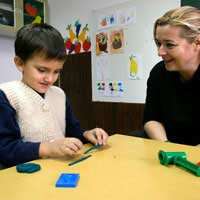Educational Psychology

Educational Psychology is the discipline of observing and helping pupils with difficulties in the school environment: similar in some respects to how a psychologist might help an adult with an emotional or behavioural problem.
School Psychologists
A school psychologist is an individual who will be charged with the overseeing of problems with children who have either special educational needs (SEN) or who have behavioural problems which do not allow them to interact with their fellow pupils in a manner befitting of their surroundings.A school psychologist will spend time with a pupil - or group of pupils - and try to establish reasons for their behaviour or their inability to learn. Then once they have established reasons for these problems they will then present their findings to both the teachers involved in the child - or children's - learning and also their parents.
Disabilities
There are many children within the schooling system today who have physical or learning disabilities; some of which have gone unnoticed. Mainstream schooling is now geared towards incorporating children with physical disabilities rather than segregating them and placing them in special schools and this is partly why the number of special schools in the United Kingdom has dwindled.These disabilities may include:
- Hearing impairment
- Blindness - or partial blindness
- Epilepsy
- Dyslexia
- Mild autism
Of course there are many other disabilities both physical and of an emotional or learning nature and each school has their own policy for dealing with them.
Behavioural Difficulties
Behavioural Difficulties again covers a wide range of conditions but usually they include:- Bullying
- Inability to relate to adults
- Attention Deficit Disorder (ADHD)
- Lack of motivation
- Disruptive behaviour
Again a school psychologist will be charged with identifying which of the aforementioned may be the problem.
The problem may of course stem from an emotional problem which could be triggered by a traumatic event within the family, such as the death of a loved one or the break up of the family unit. These events are unfortunately very common and therefore are two of the most commonly diagnosed reasons for behavioural and emotional problems within the school environment.
Many children, if presented with the break up of the family unit through divorce or separation, see all adults as being untrustworthy or unreliable and therefore build emotional barriers to prevent themselves from being hurt in the same way. These barriers then manifest themselves in an inability to learn - or to want to learn - and subsequently a break down in their own education.
A school psychologist may be called upon to provide advice and guidance on how to best deal with a child suffering from such a condition, especially if the condition leads to the onset of bullying.
In many instances of bullying it has been documented that the reason the child has become a bully is in order for he or she to project their will and authority onto others around them when they cannot at home.
School psychologists are also called upon to help with ways in which such children can be educated and means by which to encourage them to work. They can also work in conjunction with Learning Mentors who may spend time with these children on a one-to-one basis in order to help them regain lost ground or to help build up their confidence in dealing with adults.
If you think your child may benefit from such assistance you should speak to the school's headteacher and ask as to what they can do to help.
- Pros and Cons of After School Clubs
- How Schools Implement School Improvement Plans
- Numeracy Skills
- Physical Education and its Benefits
- The Best Methods of Ensuring a School Place
- Making Donations to the School
- Networking to Get a School Place
- How Schools Prioritise Places
- Be Prepared with a Second Choice School


Re: What Constitutes Bullying?
Kak esehiko sminor k112 gettherightschool.co.uk
Re: What to Include in an Appeal
Hi.We will move to Cardiff during the Summer vacation to be closer to my elderly parents ( having postponed the move twice due to…
Re: The Schools System in the UK
Very useful information. I did not know that there are so many different types of schools in England. I have known only Grammar…
Re: What to Include in an Appeal
My daughter didn t get a place at her first choice of secondaryschool.all her friends from school are going there.since she found…
Re: What to Include in an Appeal
Hello. We applied for a school place- secondary school for our son. We put 2 preferred schools, but he was offered a place in 3th…
Re: Moving from a State Primary to Private Secondary School
Heya. In order to decide meet with the school head teacher. Create a list of good options. Make…
Re: What If My Child Can't Get a Place at Any School in the Area?
Our grandson has not been given a senior school since September 2023 The appeal date…
Re: Sixth Form Applications
Hi, I have done Grade 12 from federal board Pakistan. Now I have migrated to UK. Now I am confused about the courses and admission…
Re: Get a Place at Grammar School
My sons are in year 9 and year 6 and planning to move in june to UK from Spain. In Spain they are in British school. Do they get…
Re: Applying to Private School: Special Needs Child
Hello, My son is 8 years old. He is going to praimary school in year 3. Speech therapist said, He have…